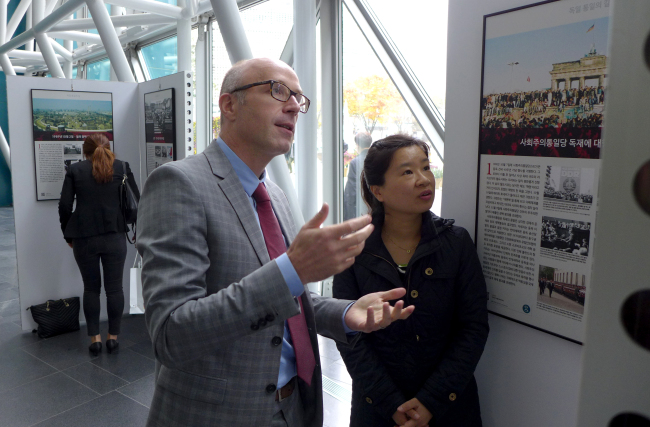The German embassy spotlighted the crucial period after the Berlin Wall fell in November 1989 to Germany’s reunification a year later in an exhibition last week at Seoul City Hall.
Jointly organized by the German Ministry of Foreign Affairs and the Federal Foundation for the Reappraisal of the SED Dictatorship, the one-week exhibit commemorated the 25th anniversary of Germany’s restored sovereignty.
“In celebrating our anniversary, we felt that our experience of separation had actually strengthened our connections with Korea,” the German embassy’s first secretary Markus Hatzelmann told The Korea Herald and other media outlets last week.
“This was evident during the state visit of our President Joachim Gauck to Korea in October,” he added, noting the president’s role as a leader of erstwhile East Germany’s democratic movement and the first Federal Commissioner for the Stasi Records at the Bundestag, which deals with historical justice.
 |
German embassy first secretary Markus Hatzelmann (left) and embassy press officer Kim Tae-young observe an exhibition commemorating the 25th anniversary of German reunification at the Seoul City Hall lobby on Nov. 16. Joel Lee/The Korea Herald |
A large section of the exhibit outlined the Treaty on the Final Settlement with Respect to Germany, or the Two Plus Four Agreement, which involved the former Federal Republic of Germany (West Germany), the German Democratic Republic (East Germany) and the four powers that occupied the country from the end of World War II: France, the U.K., the Soviet Union and the U.S.
Signed in Moscow on Sept. 12, 1990, the treaty paved the way for German reunification on Oct. 3, 1990, with East Germany being subsumed into a united Germany.
Under the compact, the four powers renounced the rights previously bestowed to them over the territory of Germany, including the city of Berlin, and returned full sovereignty on March 15, 1991.
The watershed concord guaranteed Germany the right to form and keep alliances, free from external influence, and deploy troops in areas formerly controlled by the Soviet military, which departed by the end of 1994.
“The treaty was a big step and a decisive agreement for our unification,” the German diplomat said. “The four powers realized that a united Germany would align its interests with theirs and those of a unified Europe.”
The East Germans took matters into their hands, protesting for freedom and democracy on the street, eventually tearing down the Berlin Wall, he added. “Once the wall came down, politics and diplomacy seized the opportunity to institutionalize the unification.”
The treaty prohibited Germany from having armed forces of over 370,000 soldiers, as well as nuclear, biological and chemical weapons in compliance with the Nuclear Nonproliferation Treaty.
Another crucial aspect was a border agreement with Poland, recognizing the land east of the Oder-Neisse Line as Polish territories, despite the area historically belonging to Germany before 1937. The German-Polish Treaty of Nov. 14, 1990, prevented potential dispute over the territories.
In retrospect, the German unification was instrumental to European integration, according to the exhibition. Germany has played a central role in the expansion and consolidation of the European Union, and taken greater responsibilities on global affairs.
Twenty-five years on, the country’s head of government and head of state are both from East Germany: Chancellor Angela Merkel, from Hamburg, and President Joachim Gauck from Rostock.
In a government publication titled “25 Years of Freedom and Unity,” Merkel wrote: “The differences between eastern and western Germany have become minimal, particularly in living standards and infrastructures. The consequences of socialist economic mismanagement have been largely overcome.”
There are lingering disparities in economic output, employment and income between eastern and western Germany, where the former trails the latter by 20 to 30 percent. Merkel, acknowledging inherent regional differences, stressed the aim was “to bring about ‘equal’ rather than ‘identical’ living standards.”
“For younger generations who have no personal memory of the East German dictatorship or the Berlin Wall,” she said, “living in a reunited Germany is the most natural thing in the world.”
By Joel Lee (
joel@heraldcorp.com)








